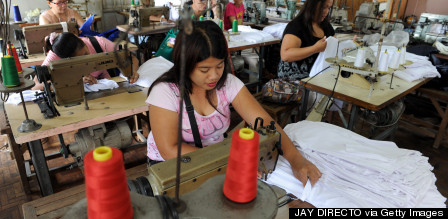
We visit an office supply store to buy pens: Made in China. We order cleaning products: Made in Vietnam. We try on a new pair of sneakers: Made in Indonesia. We browse new cell phones and computers: Made in China, Made in China.
The issue is not where these products are manufactured, it's under what conditions. It is no secret that manufacturing in places with inexpensive labor and lax regulations causes a negative economic, cultural and environmental ripple across the globe. The news is full of these disasters -- factory fires and mass deaths, suicides and more.
Yet, we live in a society where it is not always easy to find products that are made any other way -- even if we are incredibly conscious about what we are buying. Why do I go to Fairway and find "organic" broccoli that is a "product of China"? Can I even believe it? What makes this viable?
My tenure as a business owner in the furniture industry, which is flooded with poor quality knockoffs, copies and counterfeits, has given me even more reason to focus on the impact that the choices my organization makes globally -- now and into the future.
What is more disturbing than knock-off products and cheap materials, is what goes on behind the scenes, as it is easy to turn a blind eye. High quality products that are finished individually, with care by craftsman, are the result of manufacturers' policies that support good working conditions and fair pay. The "behind the scenes" is what we look at, and why we visit the factories we buy from.
The shiny appeal of lax regulations and cheap labor has charmed far too many firms, persuading them to send their manufacturing operations to places like China. The working conditions are night and day. In my own company, the products are made in Italy by salaried employees that receive vacation time (even too much vacation time!) holiday time off, maternity leave, healthcare, production bonuses, bathroom breaks, lunchtime -- and a real life outside of work. We support manufacturers that employ workers with 35-40 hour work weeks, employees with families and kids in school, religious affiliations, hobbies and social groups -- all the things that make a life worth living. It's not about 80 to 100 hour work weeks with a "life" crammed into a dorm room on the manufacturing campus. When purchasing products that are manufactured in this system, the consequence extends beyond just saving a few dollars -- it means supporting a culture of long hours and low pay and, in the extreme, human rights violations. And don't tell me this is all part of how a poorer nation industrializes and moves its population into the middle class!
Employees are not the only ones that benefit from a fair and responsible manufacturing model. The knowledge, experience and loyalty of the workers and craftsman are cultivated this way, and this is a crucial fact for the success of our products and our organization as a whole. We believe so strongly in the quality and longevity of the furniture, that we offer a lifetime warranty. This quality has been created as a result of supporting labor appropriately. These things go hand-in-hand, and are not separable to us.
50 years of design and engineering has gone into the products we import from Italy, and because we are so reliant on the skill and responsibility of the labor there, there are no short-cuts available in the production process, so it is something a smaller scale business like ours cannot make happen in China, and something we don't want to do.
Apart from the economic and cultural impacts of irresponsible manufacturing, the not-so-tiny elephant in the room is the environmental impact. We have all seen the shocking photos of major manufacturing hubs with such heavy pollution that they have become almost uninhabitable. It is easy to take the "out of sight, out of mind" approach when you are half a world away, looking up at a blue, cloudless sky. But the reality is that every day the conditions worsen due to choices that humans -- thousands upon thousands of miles away -- are making. And every day the effects resonate closer to home.
Pollution isn't like Las Vegas -- what happens in the Gansu Province, doesn't necessarily stay in the Gansu Province.
An Italian colleague of mine just came back from Beijing. He was visiting New York on his way back to Italy, and he said that, not only couldn't he breathe in the city, but he could taste gasoline exhaust in every bite of food. We all know how Italians are about their food, but he insisted it was no exaggeration.
For me, this comes down to the concept of exchange. What do I give and what do I get in return? What is my exchange with the factory? What is my exchange with my employees, with their families, friends and with the environment? What is my exchange with my customers and the world at large, the planet and mankind? I ask my customers to pay more for the furniture than if it were made in China, but what do I give them? I give them a lifetime warranty, a cleaner planet, more sustainable use of raw materials, a better use of their space and a long term relationship with my company.
Selling trustworthy products is much more important than any potential profits that could be made by taking shortcuts. A company is a shared responsibility and a contract between employees and owners -- it is not diminishing people to simply "capital" to be spent. We should be asking ourselves the short term questions of: "Would I trust this product around my children?" "Would I be okay with my mother working in this factory?" and also the more long-lasting question of: "What kind of world am I creating for my children?"